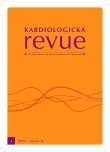-
Medical journals
- Career
Treatment of diabetes with respect to cardiovascular risk
Authors: M. Kvapil
Authors‘ workplace: Interní klinika UK 2. LF a FN Motol
Published in: Kardiol Rev Int Med 2009, 11(4): 187-189
Category: Notice
Overview
Evidence suggests that intensive treatment might lead to improved long‑term compensation of patients with type 2 diabetes. However, extensive therapy with anti‑diabetic agents is required due to disease progression. Treatment must be based on gradual titration, according to glycaemia, to individually determined target values (according to age, disease duration, micro a macrovascular complications, risk of hypoglycaemia and presence of risk factors). Normalization of glycaemia in younger individuals with shorter duration of diabetes (up to 10–15 years) also decreases cardiovascular risk. In contrast, the increased risk of hypoglycaemia associated with intensive therapy in patients with advanced changes in coronary arteries, with long‑term diabetes, might lead to increased risk of morbidity. Consequently, it is imperative to individualise treatment targets and select therapy that minimizes the risk of hypoglycaemia. Appropriateness of the selected treatment is determined by treatment outcome – achievement of tight diabetes compensation without adverse effects and with negligible risk of hypoglycaemia.
Keywords:
type 2 diabetes – glycohaemoglobin – cardiovascular risk – hyperglycaemia
Sources
1. Abraira C, Duckworth WC, Moritz T, VADT Group. Glycaemic separation and risk factor control in the Veterans Affairs Diabetes Trial: an interim analysis. Diab Obes Metab 2008; 11 : 150–156.
2. Gerstein HC, Miller ME, Byington RP et al. Action to Control Cardiovascular Risk in Diabetes Study Group. Effects of intensive glucose lowering in type 2 diabetes. N Engl J Med 2008; 358 : 2545–2559.
3. Gerstein HC, Riddle MC, Kendall DM et al. ACCORD Study Group. Glycemia treatment strategies in the the action to control cardiovascular risk in diabetes (ACCORD) trial. Am J Cardiol 2007; 99 : 34i–43i.
4. Buse JB, Bigger JT, Byington RP et al. ACCORD Study Group. Action to Control Cardiovascular Risk in Diabetes (ACCORD) trial: design and methods. Am J Cardiol 2007; 99 : 21i–33i.
5. Patel A, MacMahon S, Chalmers J. ADVANCE Collaborative Group. Intensive blood glucose control and vascular outcomes in patients with type 2 diabetes. N Engl J Med 2008; 358 : 2560–2572.
6. Ray KK, Seshasai SR, Wijesuriya S et al. Effect of intensive control of glucose on cardiovascular outcom and death in patiens with diabetes mellitus : a meta‑analysis of randomised controlled trials. Lancet 2009; 373 : 1765–1772.
7. Stettler C, Allemann S, Jüni P et al. Glycemic control and macrovacular dinsease in types 1and 2 diabetes mellitus: Meta‑analysis of randomised trials. Am Heart J 2006; 152 : 27–38.
8. Turnbull FM, Abraira C, Anderson RJ et al. Intensive glucose control and macrovascular outcomes in type 2 diabetes. Diabetologia 2009; 52 : 2288–2298.
9. Holman RR, Paul SK, Bethel MA et al. 10‑year folow-up of intensive glucose control in type 2 diabetes. N Engl J Med 2008; 359 : 1577–1589.
10. Chalmers J, Zoungas S, Ninomiya T et al. New results from ADVANCE. IDF Congress Invited Talk, 22 October 2009. Montreal, Canada.
11. Kengne AP, Patel A, Colagiuri S et al. Derivation of the ADVANCE models for predicting the risk of major cardiovascular disease in people with diabetes. Oral presentation, IDF Congress, 20 October 2009. Montreal, Canada.
12. Schernthaner G, Grimaldi A, Di Mario U et al. GUIDE study: double blind comparison of once-daily gliclazide MR and glimepride in type 2 diabetic patients. Eur J Clin Invest 2004; 34 : 535–542.
13. Nathan DM, Buse JB, Davidson MB et al. Management of hyperglycaemia in type 2 diabetes: a consensus algorithm for the initiation and adjustment of therapy. A consensus statement from the American Diabetes Association and the European Association for the Study of Diabetes. Diabetologia 2006; 49 : 1711–1721.
Labels
Paediatric cardiology Internal medicine Cardiac surgery Cardiology
Article was published inCardiology Review

2009 Issue 4-
All articles in this issue
- Pulmonary arterial hypertension
- Pulmonary embolism
- Congenital heart defects with pulmonary hypertension
- Pulmonary Hypertension in Patients with Chronic Obstructive Pulmonary Disease
- Pleural effusion – aetiology and diagnostics
- Treatment of diabetes with respect to cardiovascular risk
- The future of dyslipidemia therapy
- Who preaches water and drinks wine – Cardiovascular risk in a medical population in a project
- Cardiology Review
- Journal archive
- Current issue
- Online only
- About the journal
Most read in this issue- Pleural effusion – aetiology and diagnostics
- Pulmonary embolism
- Congenital heart defects with pulmonary hypertension
- Pulmonary Hypertension in Patients with Chronic Obstructive Pulmonary Disease
Login#ADS_BOTTOM_SCRIPTS#Forgotten passwordEnter the email address that you registered with. We will send you instructions on how to set a new password.
- Career

